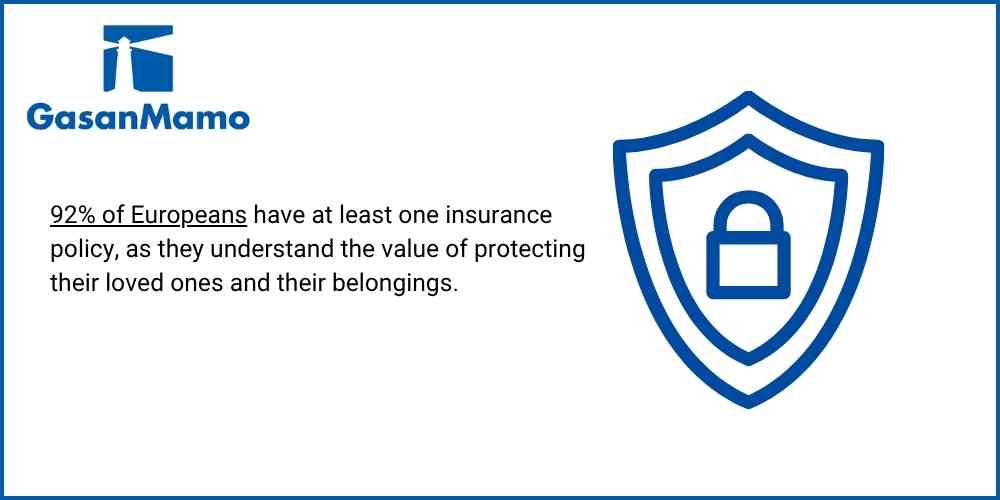
Insurance is important to many people because it provides a financial safety net and protects loved ones, property and possessions. The latest statistics show that there are typically 2.8 billion euros of insurance claims paid per day in Europe.
Investing in an insurance policy may seem like a commitment, but it can be essential if something unexpected happens and you suddenly have a bill for car repair or flood damage to your property.
Insurance is a contract or ‘promise’ that an amount of money will be paid to you by your insurer in the event of an accident or situation that is covered in your insurance policy.
An example of this is you take out travel insurance to cover a trip abroad. You go on holiday and your camera is stolen. Your camera is covered under your travel insurance, so when you get home you contact your insurer and start a claim for the loss of your camera.
If your claim is approved, your insurance provider will compensate you for the camera so that you can replace it. If you’ve ever lost something important to you, you’ll know how vital replacing it is.
In fact, 92% of Europeans have at least one insurance policy, as they understand the value of protecting their loved ones and their belongings.

In this article, we explore exactly what is insurance, how insurance works, and the insurance essentials that will help you get the most out of your insurance.
Contents
- How does insurance work?
- Key aspects of insurance.
- Find essential insurance policies with GasanMamo.
How does insurance work?
Every insurance policy is different. An insurance plan will differ from insurer to insurer, and contain certain aspects depending on the specific area the policy is covering.
For example, health insurance will insure you for certain events, such as a medical appointment or treatment, whereas business insurance will cover a range of issues, from loss of income to property damage.
There are some major similarities that link most insurance policies. In most cases, people looking for insurance will search for one that suits their needs, talk to the insurance provider about this policy, receive and sign a contract, then make a payment to activate the insurance.
In the event you make a claim against your insurance, your insurance provider will have a process in place for you to follow.
Take the example of a car accident. Here are five steps your car accident insurance claim is likely to follow:
- Policy selection
You’re looking for a specific insurance plan to protect your car and need motor insurance to drive your vehicle. You shop around and find the best insurance policy for your needs, vehicle type and model.
After contacting the insurance provider, you sign your policy contract and now have motor insurance.
- Plan payment
In order to activate your insurance policy, you will need to make your one annual payment.
The amount you pay will depend on what you’re insuring, your risk factors (age, address and claims history), and the insurance provider you choose. Car insurance can cost a little more if you’re a new driver or have an expensive car model.
- Claim filing
You’re involved in a car accident and you need to make a claim. It’s good practice to collect the details of any other drivers or passengers involved in the accident. Depending on the severity of the incident, you may need to contact the authorities or the police to ensure the safety of all involved parties.
Once you’re ready and have all of the necessary details you need to make your claim, contact your insurance provider and share the claim information, including any police reference number.
- Claim processing
Your insurance provider will assess all of your information to ensure that the claim is valid and covered by the terms of your policy. They will generally let you know once the claim has been processed.
- Claim payment
Once your claim has been approved, you will receive a claim payment from your insurance provider in the timeframe they provide.
Key aspects of insurance
You may not be aware of the meaning of the insurance terms you notice in your insurance policy documentation. Here is a definition of some of the most common insurance-related words you may come across:
Policy
A policy is the contract which contains the details of your insurance cover. This contract is usually between you (the insured) and your insurance provider (the insurer). An insurance policy will tell you the length of your insurance cover, the type of cover you have, and how to make a claim.
Premium
An insurance premium is the sum of money you pay to an insurance company in exchange for insurance protection. Generally, you pay for your premium with an annual payment. This payment ensures that your insurance policy stays active and keeps you covered in case an unexpected event occurs.
Claim
An insurance claim is the process you go through to let your insurance company know that you need to request compensation for covered loss, damage or an accident. Your insurance provider will have a set process for submitting a claim they will share with you when you take out your insurance policy.
Payout
A payout is the sum of money your insurance provider pays to you when a claim has been approved for a covered event. Your payout will be calculated on the type of event that has occurred, your policy specifications and the extent of the loss.
Indemnity
An insurance indemnity has the purpose of restoring you to the financial position you were in before your financial loss which is a covered event under your insurance policy. Put simply, this is the amount of compensation you receive for an approved claim.
Find essential insurance policies with GasanMamo
Part of our service is to share our years of insurance experience with you so you get the right insurance for your needs. Our friendly team is happy to talk through your situation and see how we can personalise your cover.
Let us help you gain protection with the insurance policy you’ve been searching for. Contact GasanMamo today or get a quote online to enjoy peace of mind and unparalleled service.
GasanMamo Insurance is authorised under the Insurance Business Act and regulated by the MFSA.
Photo © by Mojo_cp